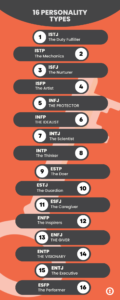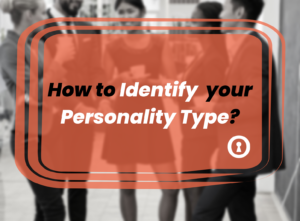Introduction
Have you ever wondered why some people are good at communication and are outgoing and confident in public, while others are more reserved and introspective?
Some people thrive in fast-paced environments, while others crave a peaceful place.
These unique personalities shape the way we perceive the world and interact with our outer world. You can unlock a wealth of insights by recognizing your personality type from the way you communicate to the careers you can choose.
In this blog, we will be talking about different types of personalities. There are a total of 16 personality types. A psychologist, Carl Jung proposed a personality theory to identify your personality type. You can gain insights into yourself, gain self-awareness, improve your relationships, and satisfy your curiosity about why people behave the way they behave.
What are Personality Types?
According to psychology, the “personality” of a person refers to the combination of qualities that form a person’s unique character. Personality type is a collection of characteristic patterns of thoughts, feelings, and behaviors that define an individual’s unique way of experiencing and expressing the world around them. Personality types are widely classified by traits such as introversion or extroversion, openness to experience, agreeableness, conscientiousness, and neuroticism. The idea of personality types has been explored by Carl Jung. He developed the concept of the Myers-Briggs Type Indicator (MBTI), which lays down the categories of personality.
Psychological Functions and Attitudes that Affect Your Personality
Attitude
According to Carl Jung’s personality theory, a number of psychological temperaments are distinguished by analytical psychology into extroversion and introversion. The functions are later modified by these two attitude types. Introversion and extroversion are the two terms used to describe various personality traits. Traits are characterized by the way people interact with the world around them, how they recharge their energy, and how they process information and their emotions. Extraversion means “turning outwards,” and introversion means “going inwards.” These traits are often called attitudes.
People with extroverted attitudes tend to recharge their energy through social interactions. They are more outgoing and enjoy social interactions more than alone time. Being around people can make them feel energized, and they might look for new challenges and stimulation.
Introverted people tend to be more reserved and prefer to spend time alone or in small groups. Too much social interaction may cause them to become more introspective and reflective. They may feel drained of energy when having too much social interaction. Introverts are more impulsive and have a higher tolerance for noise and other external stimuli.
However, in different situations or at different points in their lives, people may exhibit different levels of introversion or extroversion. The distinction between introversion and extroversion is crucial to understand because they are not black-and-white categories.
Functions
Carl Jung perceived two pairs of psychological functions in his personality theory. The two irrational functions are sensation and intuition, and the other two rational functions are thinking and feeling.
Sensation and intuition functions are irrational (perception). They gather information. These functions decide how information is received and processed. People who prefer sensation, are likely to trust information that is real, concrete, and actual. They are seekers of information themselves. Whereas, people who prefer intuition are likely interested in hidden possibilities.
Thinking and feeling are rational (judgment) functions. They form judgments or make decisions. These functions are used to make rational decisions based on the data received by sensing or intuition.
Also Read: Overcoming the Dunning Kruger Effect in your Career| DT Evolve
16 Personality Types
Personality types are differentiated into 16 types. The letters in the personality type acronym correspond to the general attitude and functions- “E” for extraversion, “I” for introversion, “S” stands for sensing, “N” stands for intuition, “T” for thinking, “F” for feeling, “J” for judging, and “P” for perception.
ISTJ: The Duty Fulfiller
ISTJ personality type stands for Introversion, sensing, thinking, judging. The duty fulfillers are presented as serious and formal. People of this personality type value traditions and adhere to principles such as integrity, diligence, and social responsibility. They are usually of reserved, quiet, and upright nature. They are reputed for being trustworthy and responsible at work. They also enjoy the rules laid out for them and thrive in an organized workplace. Well-developed concentration is one of their strengths, and they can achieve any goal once they set their minds to it. They are also meticulous, with sharp analytical and critical thinking abilities.
ISTP: The Mechanics
ISTP personality type stands for introversion, sensing, thinking, perception. This personality type is fascinated by how and why things operate. Generally, they are quiet and reserved. People with these characteristics are often risk-takers who prioritize their personal goals over societal norms. They tend to be independent thinkers who approach challenges with a logical and rational mindset. They live in the present moment. Exhibits loyalty toward their peers and their internal value systems. As they are detached and analytical, they are good at troubleshooting problems.
ISFJ: The Nurturer
ISFJ personality type stands for Introversion, sensing, feeling, judging. People with this personality type are also quiet but also kind and conscientious. They enjoy giving back with even more generosity. Valuing harmony and cooperation is important for them. These people are warm and kind-hearted and sensitive to others’ feelings. They are dedicated to their work. They usually put others’ needs before their own.
ISFP: The Artist
ISFP personality type stands for Introversion, sensing, feeling, perception. Introverts who are actually not introverts. Unlike introverts, this personality type is approachable and friendly. They are fun to be with. They have a knack for living life to the fullest and in the present moment. People who like to meet with people who enjoy exploring and discovering new things. Harmony plays an important role in their lives, which is why they hate to confront others and keep their opinions to themselves. Often, these people appreciate the beauty of aesthetics. They are open-minded and flexible.
INFJ: The Protector
INFJ personality type stands for Introversion, intuition, feeling, judging. The protectors have a quietly forceful, original, and sensitive nature. People with these traits are often seen as independent thinkers who are guided by their own moral compass. They tend to prioritize their personal values over external influences and are highly respected for their unwavering commitment to doing what they believe is right. They are most sensitive to individuals and worried about their emotions.
INFP: The Idealist
INFP personality type stands for Introversion, intuition, feeling, perception. As the name suggests, this personality type is idealistic, quiet, and reflective. People with these traits are often able to easily adjust to new situations and remain calm under pressure, but they can become very passionate and defensive when something they deeply believe in is challenged.
They are also likely to be empathetic and enjoy using their writing skills to communicate and connect with others. They are often good at problem-solving and can think creatively to find solutions. They are empathetic and enjoy connecting with others on a deeper level. They tend to be empathetic and have a natural ability to connect with others. They are often drawn to careers in counseling, social work, or other helping professions.
INTJ: The Scientist
INTJ personality type stands for introversion, intuition, thinking, judging. With introverted intuition dominating their personalities, INTJs focus their energy on observing the world and generating ideas and possibilities. Their mind constantly gathers information and makes associations about it. They are tremendously insightful and are usually very quick to understand new ideas. However, their primary interest is not understanding a concept but rather applying that concept in a useful way. INTJs are driven to come to conclusions about ideas. They are born leaders.
INTP: The Thinker
INTP personality type stands for introversion, intuition, thinking, perception. The INTP is usually very independent, unconventional, and original. They are not likely to place much value on traditional goals such as popularity and security. The INTP is at their best when given an environment that supports their creative genius and eccentricity, making them pioneers of new thoughts in society. They are complex characters and may be restless and temperamental. They have unconventional thought patterns that allow them to analyze ideas in creative ways, leading to scientific breakthroughs around the world.
ESTP: The Doer
ESTP personality type stands for extraversion, sensing, thinking, perception. The doers live their lives by focusing externally. This type of person lives in the world of action. They are practical, observant, fun-loving, spontaneous risk-takers with the ability to quickly improvise an innovative solution to a problem. They are great motivators and can achieve great things if they recognize their real talents and operate within them. Facts and logic are the main pillars of their decision-making process.
ESTJ: The Guardian
ESTJ personality type stands for extraversion, sensing, thinking, judging. They are fact-based people who have actual needs. Their primary mode of living is external, where they deal with things rationally and logically. They honor traditions and laws and have a clear set of standards and beliefs. They value competence and efficiency and like to see quick results for their efforts. They are known for their strong sense of responsibility and commitment to duty, making them reliable and trustworthy individuals. They thrive in structured environments where rules and procedures are clearly defined, and they excel at managing people and resources to achieve their goals.
ESFP: The Performer
ESFP personality type stands for extraversion, sensing, feeling, perception. They are often spontaneous and adventurous, always seeking out the next thrill. However, they may struggle with commitment and planning for the future.
People with these traits live in the moment, which can make them exciting to be around. However, their lack of long-term planning may lead to difficulties in achieving their goals and fulfilling their potential. They are often described as outgoing and practical, with a strong desire to make a positive impact on the world around them. They may excel in fields such as teaching, counseling, or social work, where they can use their interpersonal skills to help others.
ESFJ: The Caregiver
ESFP personality type stands for extraversion, sensing, feeling, judging. Extroverted people deal with things on the basis of how they feel about them or how they fit into their personal value system. They love being around people and are warmly interested in others. They develop supportive judgments by using their sensing and judging personality traits. They can bring out the best in the people around them. They are people pleasers and extremely good at reading others and understanding their points of view. They are responsible, warm, energetic, and dependable.
ENFP: The Inspirers
ENFP personality type stands for extraversion, intuition, feeling, perception. The inspirers are extroverted, intuitive, feeling, and perceiving people who are passionate about life and enthusiastic about possibilities. They embody a strong sense of values and are good at things that interest them. Sometimes, they can struggle with following through on projects and may jump to conclusions, making serious mistakes in judgment.
They have an exceptional level of understanding and the ability to relate to others. They are people-oriented, warm, and charming. They thrive in situations where they have flexibility and can work with people and ideas. When confined to strict schedules or mundane tasks, they can become unhappy and lose efficiency in their work.
ENFJ: The Giver
ENFJ personality type stands for extraversion, intuition, feeling, judging. The givers have outstanding people skills. They are most concerned with how others think and feel. They hate being alone. They can manage people effectively, so they have great management and leadership skills. Their main motive in life is to give love, support, and a good time to other people. They have strong values and are straightforward and honest, but sometimes they can be misunderstood because of their tendency to confront others honestly.
ENTP: The Visionary
ENTP stands for extraversion, intuition, thinking, perception. If you identify yourself with this personality type, your primary mode of perception is intuition. You are more likely to deal with issues logically and rationally. Their main interest in life is comprehending their environment. They assess a situation very quickly and accurately, using their intuition to process this information. They have the advantage of their innate capacity to understand people and situations. They believe in the world of possibilities, which is why they are known as visionaries. They are always hungry for knowledge and never miss a chance to seek higher understanding.
ENTJ: The Executive
The ENTJ personality type stands for extraversion, intuition, thinking, judging. People of this personality type are born leaders. They have outstanding leadership skills and are always ready to take charge of people. They hate to make mistakes. They have little patience with people who are not the same as ENTJs. The only disadvantage for them is that they do not value the opinions of others. They may seem overbearing as spouses or parents as they lack sensitivity towards people’s feelings. They can better fit in the corporate world as they have an immaculate amount of personal power and presence, which makes them seem like a force towards achieving their goals.
Also Read: How Heuristic thinking helps in Reasoning logically and Correctly? | DT Evolve
How To Identify Your Personality Type
Identifying your personality type comes into play when you want to expand your self-awareness. You can unlock a wealth of insights by recognizing your personality type, from the way you communicate to the careers you can choose. Let’s find out how you can identify your personality type.
- The first step to identifying your personality type is to determine whether you fall into the category of introverts or extroverts.
- Read about the different personality types and their characteristics. By doing this, you can get a grasp of your strengths, weaknesses, and how you interact with others.
- You can ask your friends, family, or colleagues for feedback on your personality. They may know you better than yourself.
- Take note of your emotional responses to different situations.
- Finally, to determine your personality type, you can take a personality test like the MBTI test. You can find out your personality type here: https://sites.temple.edu/rtassessment/files/2018/10/Table_BFPT.pdf
Conclusion
In this blog, you will find a breakdown of the personality types that are commonly used in psychology. This blog discusses the concept of personality types, the psychological functions, and attitudes that affect an individual’s personality type. According to Carl Jung’s personality theory, there are a total of 16 different personality types.
Frequently Asked Questions (FAQs)
There are 16 different personality types in total. They are ISTJ, ISTP, ISFJ, ISFP, INFJ, INFP, INTJ, INTP, ESTP, ESTJ, ESFP, ESFJ, ENFP, ENFJ, ENTP, and ENTJ.
The doers live their lives by focusing externally. This type of person lives in the world of action. They are practical, observant, fun-loving, spontaneous risk-takers with the ability to quickly improvise an innovative solution to a problem. They are great motivators and can achieve great things if they recognize their real talents.
The purpose of identifying your personality type is to help people understand themselves and others better. It can provide a framework for personal and professional development. Your personality type can be used to identify strengths and weaknesses and guide relationship choices.
Your personality type can change over time, such as in levels of assertiveness or emotional stability, but the core elements of your personality types are believed to be stable throughout adulthood. Through practice, a person may develop skills and behaviors outside of their natural tendencies.
You can identify your personality type by determining whether you fall into the category of introverts or extroverts, reading about different personality types, seeking feedback from friends or family, taking note of your emotional responses, and taking a personality test like the MBTI.
Yes, different personality types can get along really well.
Extraversion and introversion are personality preferences that describe how a person interacts with the outside world. Introverts get their energy from being alone, whereas extroverts get their energy from social interaction.
A person’s personality type is determined by attitudes like extroversion and introversion and functions like sensing and intuition, thinking and feeling, and judging and perceiving.
Thinking and feeling are rational (judgment) functions. They form judgments or make decisions.
The “personality” of a person refers to the combination of qualities that form a person’s unique character.




















Comments 2